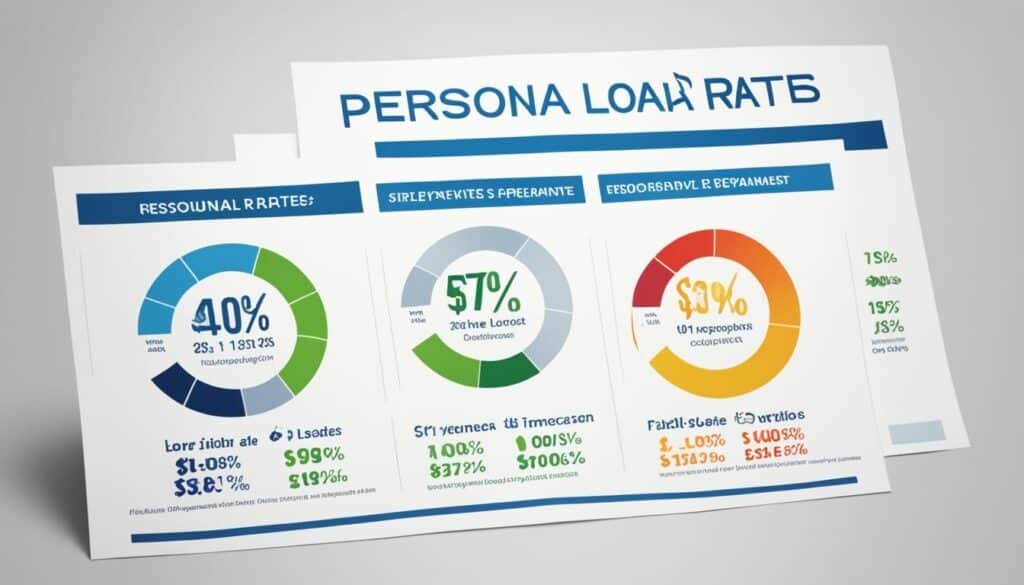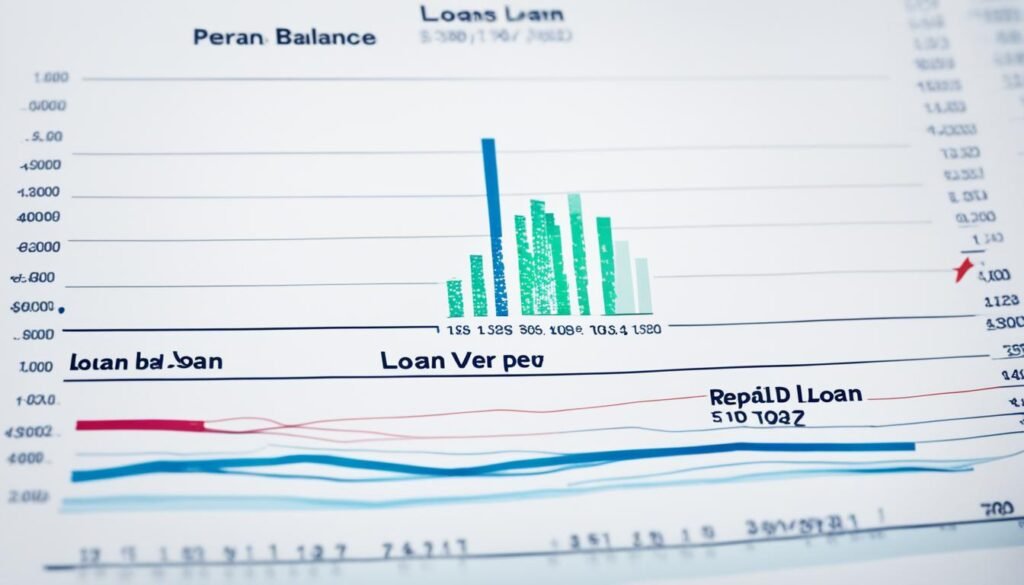Personal loans are often chosen to cover various needs, from debt consolidation to important life events. It’s important to know how personal loan repayment works. This piece will look at vital points like interest rates, credit score needs, collateral, and the usual loan terms and approval process.
A lot of people like personal loans because they are easy to apply for online. The most common type is unsecured personal loans, which don’t need collateral. Lenders review your credit score, credit history, income, and debts to decide if you qualify. A personal loan is usually a one-time payment with a set time for paying it back, which could be up to ten years, and a steady interest rate.
To get a personal loan, you need to show pay stubs, personal details, and bank info. Some places let you check if you qualify without it affecting your credit score. Your credit score plays a big role in your interest rate. Your income, debt-to-income ratio, and the loan’s term also matter.
People use personal loans for all kinds of things, like debt consolidation, handling emergency expenses, improving their home, and celebrating life’s big moments. The steady monthly payments and known interest rates attract many borrowers to these loans.
Key Takeaways
- Personal loans are available in both secured and unsecured forms, with unsecured loans being more common.
- Lenders assess a borrower’s credit score, credit history, income, and debt levels to determine eligibility and interest rates.
- Personal loans can be used for a variety of purposes, including debt consolidation, emergency expenses, and home improvements.
- Personal loans typically have fixed repayment periods and interest rates, making them a predictable and reliable borrowing option.
- The application process for a personal loan involves providing documentation and may include a pre-qualification process to check eligibility.
Understanding Personal Loans
Personal loans help people handle various expenses. They can be used for things like paying off debts or celebrating big life moments. Borrowers get a set amount of money. They then pay it back over time with interest. The rates are based on their financial history and needs.
Definition and Key Features
A personal loan is a kind of installment loan. It doesn’t need collateral, unlike many other loans. Lenders look at things like your credit, income, and debts to decide if you can get one. If you can’t pay back a secured loan, the lender might take your pledged item, like a car.
Secured vs. Unsecured Personal Loans
Unsecured loans are more common. People use them for big buys, debt merging, or urgent costs. Secured loans might have lower rates but risk losing your asset if you can’t repay. It’s up to each borrower to see what loan type works best for them.
Common Uses of Personal Loans
Personal loans come in handy for many reasons. You can get them for debt combo, home fix-ups, or even to get married. They also help with education, starting a business, and boosting your credit. In some cases, they serve as quick, short-term fixes or as safer options than payday loans.
Applying for a Personal Loan
The first step to getting a personal loan is collecting important documents. These include your pay stubs, personal info like your address and driver’s license, and bank account details.
Preparing Your Documentation
This info is very important. It helps in filling up the loan form. Lenders use it to check your identity and finances. They want to see if you meet the personal loan eligibility criteria.
Pre-Qualification Process
Some lenders will let you check if you’re eligible for a loan without hurting your credit score. You tell them a bit about your credit and finances. They give you an idea of how much you could borrow and the interest rate.
Factors Affecting Loan Approval
Lenders look at a few key things to decide if they’ll give you a loan. These include your credit score, income, and how much debt you have compared to your income. Those with good credit, stable jobs, and not too much debt have a better chance of getting a loan. They also go through the loan process smoothly.
Determining Your Interest Rate

Interest rates are key when you get a personal loan. They hugely affect how much you pay back. For personal loans, your credit score decides a lot. A score of 660 or more is often needed for a loan. The very best rates go to those with scores over 800.
Credit Score Importance
A credit score shows how good someone is with paying back money, from 300 to 850. The lender looks at this to decide how risky it is to loan money. The better your score, the lower your risk. And lower risk can mean better interest rates.
Income and Debt-to-Income Ratio
Your income and how much you owe, or debt-to-income ratio, matter too. Lenders like to know you have a solid income. They also want to see you don’t owe too much compared to what you earn. This helps them believe you can easily make your loan payments.
Loan Term and Amount Impact
The loan term (how long) and the loan amount can affect your interest rate. For example, bigger loans or loans over a longer time might have higher rates. This is because the lender is taking on more risk by giving you more money or more time to pay back.
Personal Loan Repayment Terms

Borrowers can pick either fixed-rate or variable-rate personal loans. Fixed-rate personal loans ensure your payments don’t change. They’re good for debt consolidation or sticking to a budget. On the other hand, variable-rate personal loans might change, depending on the market.
Fixed vs. Variable Interest Rates
Most personal loans have a fixed rate which helps you know your set monthly payments. This is great for those paying off big debts because it’s easier to manage. Variable-rate personal loans are out there too. Their rates can go up or down with market changes.
Typical Repayment Periods
Personal loan repayment periods can vary from one to ten years, but they’re commonly one to seven years. The period you choose affects your monthly payment and interest. A longer period means lower monthly payments but higher overall interest.
Monthly Payment Calculations
To know your monthly payment, lenders look at how much you’re borrowing, the interest rate, and how long you’ll take to pay it back. This helps them set a fixed monthly payment you must make. Things like the personal loan payment schedule and personal loan disbursement play a role too.
| Loan Type | Interest Rate Structure | Typical Repayment Period | Monthly Payment Calculation |
|---|---|---|---|
| Fixed-Rate Personal Loan | Interest rate remains the same throughout the loan term | 1-7 years | Determined by loan amount, interest rate, and repayment period |
| Variable-Rate Personal Loan | Interest rate can fluctuate based on market conditions | 1-7 years | Determined by loan amount, interest rate, and repayment period |
| Installment Personal Loan | Fixed or variable interest rate | 1-10 years | Calculated based on loan amount, interest rate, and repayment period |
| Revolving Personal Loan | Fixed or variable interest rate | Ongoing, with the ability to borrow and repay repeatedly | Determined by the outstanding loan balance and interest rate |
Knowing about personal loan repayment terms helps people choose loans that match their finances and goals.
Managing Your Personal Loan
Starting your journey with a personal loan means you should work hard to manage your payments well. There are steps like setting up autopay and keeping an eye on your credit score that really help. The decisions you make now can affect your financial health for years to come.
Setting Up Autopay
Setting up autopay is a smart move to make sure you never miss a payment. Most lenders will give you a lower interest rate if you use autopay. This means you save money over time. You’ll also steer clear of late fees and build a good payment history. Both of these are key for your credit score.
Monitoring Your Credit Score
When you first take out a personal loan, it might hurt your credit score a bit because the lender checks your credit history. But, if you pay on time and manage different types of credit well, your score will go up again. Keep an eye on your credit score to see how you’re doing and to catch any mistakes.
Prepayment Options and Penalties
Check if there are any prepayment penalties in your loan agreement for paying off your loan early. Knowing about these fees is very important. If you can, choose a lender that lets you pay off your loan early without these big fees.
Personal Loan Costs
When you’re thinking about a personal loan, understanding its costs is crucial. You need to know about personal loan origination fees and the annual percentage rate (APR).
Origination Fees
Some lenders will ask for an origination fee to process your loan. This fee is taken from your loan before you get it. It could be from 1% to 8% of the total loan amount. So, it’s important to keep this in mind while planning your borrowing strategy.
Annual Percentage Rate (APR)
The annual percentage rate (APR) is also key to understand. It shows the interest rate plus any fees. This gives you the full picture of how much you’ll really pay. APRs range from about 8% to 36%, based on your credit score and more.
Knowing about personal loan origination fees and APR helps you decide if a personal loan fits your budget and needs.
Personal Loan Alternatives

Looking for ways to finance your needs? Personal loans are not the only choice. You might also check out credit cards, home equity loans, or borrowing from family or friends.
Credit Cards
Credit cards offer more flexibility but also have high interest rates. For debt consolidation, personal loans might be better. They usually have lower rates. This makes paying off high-interest debts easier.
Home Equity Loans
A home equity loan is another option. It uses your home as backup. These loans usually have lower rates than personal loans. But, you could lose your home if you can’t repay the loan.
Borrowing from Family or Friends
Borrowing from loved ones can be a choice. But, it has its own risks. It’s more informal but can stress your relationships if not handled well.
Some might think about refinancing their current loans or combining loans for better terms. This can lead to lower interest rates or more agreeable loan conditions.
Personal Loan Benefits

Personal loans can have lower interest rates than credit cards. This is especially true if you have good credit. They come with a fixed interest rate. Plus, you know exactly how much you will pay each month. This makes personal loans great for debt consolidation.
Lower Interest Rates
With a good credit score, you may get a personal loan at a lower rate than a credit card. Lower rates mean you pay less interest over time. Also, a fixed rate helps you plan your spending better.
Debt Consolidation Opportunities
Many choose a personal loan to consolidate debt. By paying off high-interest debts, like credit cards, you lower your rates. This makes your payments simpler and could save you money. Managing your debt becomes easier and maybe even faster.
Fixed Monthly Payments
Fixed monthly payments are a key feature of personal loans. It’s easier to budget when you know exactly what you owe each month. This stability helps you plan your finances better.
Personal Loan Risks
Personal loans offer a quick way to get cash but have risks too. It can impact your personal loan credit score impact at first. The loan application includes a hard check that might lower your score.
Impact on Credit Score
Not paying back the loan (called personal loan default) can harm your credit score. This might make it hard to get loans in the future. If you default, the lender might even take you to court to collect everything you owe.
Potential for Default
Think about the costs before taking a personal loan. Fees for starting the loan and penalties for paying early can add up. This means you might get less money or have to pay more back.
Fees and Penalties
Knowing these risks helps you choose wisely. Keep a good credit score and pay on time to lessen your risk. This way, a personal loan can be a good move for your finances.
Personal Loan Regulations and Legal Aspects
The personal loan world has many rules and laws. For example, there’s the Truth in Lending Act. It makes sure lenders tell borrowers all about loans up front. This way, personal loan regulations work to keep things clear for people taking out loans.
But it doesn’t stop there. Ethical considerations in personal loans are crucial too. Lenders have to be fair and not trick anyone into bad deals. That means no huge hidden fees or sky-high interest rates. Borrowers need to know their legal aspects of personal loans too. They should be sure of their rights and what they’re getting into.
Knowing the rules and being aware of what’s right matters a lot. It helps people make smart choices and stay away from trouble. If you understand the laws and what’s fair, your loan experience can be smooth and worry-free.
Also Read: Building Dreams: The Power Of Small Business Loan
Conclusion
Personal loans are now a top choice for many financial needs, from paying off debt to financing big life moments. With new lenders and online loan platforms, keeping up with change in personal loans is key. This way, borrowers can stay smart about new trends and rules in the market.
Knowing the important points about personal loans helps people decide if they’re a good fit for their money situation. They can look into ways to get lower interest rates, combine debts, or have set monthly payments. Personal loans make for an open and easy-to-use option for lots of people.
As the future of personal loans changes, it’s vital for borrowers to keep watch and learn about new updates and rules. This makes sure they can use personal loans wisely. They can reach their money goals by knowing about this adaptable financial option.
FAQs
What is a personal loan?
What are the different types of personal loans?
How do I apply for a personal loan?
What factors determine the interest rate on a personal loan?
What are the different repayment options for personal loans?
How can I manage my personal loan effectively?
What are the costs associated with a personal loan?
What are the alternatives to a personal loan?
What are the benefits of a personal loan?
What are the risks of a personal loan?
What legal and regulatory aspects should I be aware of when taking out a personal loan?
Source Links
- https://www.investopedia.com/how-personal-loans-work-7484814
- https://www.forbes.com/advisor/personal-loans/how-do-personal-loans-work/
- https://www.bankrate.com/loans/personal-loans/what-is-a-personal-loan/




